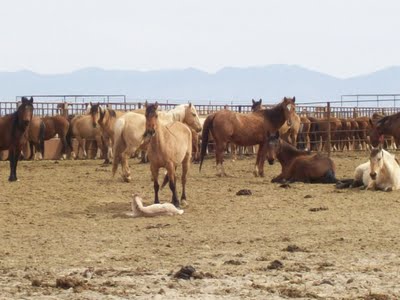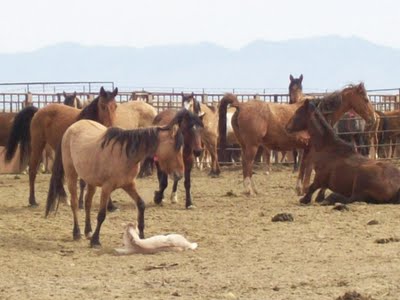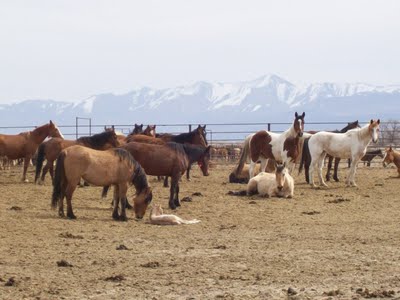
Latest Instagram Photos
       
|
||||||||||||||||||||||||||||||||||||||
|
|
||||||||||||||||||||||||||||||||||||||

Thursday, August 24, 2017
DEAR MR. PRESIDENT: WE'RE WILD HORSES. WHY DO YOU WANT TO KILL US? Dear Mr. President,We’re wild horses. Born in Nevada, we ran free on the range, manes blowing, legs reaching and pulling us up mountains and then downhill in crazy gallops, zig-zagging through storm-hammered sage brush.We’re not there anymore. We’re in a place called BLM. We’re young, healthy and we play chase when we can.So, when we heard you wanted to kill us -- not as the cougar does, one at a time to feed her young, but all together, for reasons we don’t understand --we asked a friend to speak for us in your language.Thank you, sir, The Mustangs
please turn on audio
Labels: BLM, cougar, gallop, Mr. President, Palomino Valley, sage brush, wild horses Permalink to this blog post Posted by Terri Farley @ 6:56 PM 0 comments Thursday, December 15, 2016 Rough Weather Ahead for Captive Mustangs
Thirty years ago, I visited BLM's Palomino Valley wild horse corrals for the first time and saw a palomino foal drown in the mud. Since then, I often visit after heavy rains, just to keep watch.
Over time, improvements have been made, but changes reflect human ideas of what's cost-efficient. Last month, BLM-authorized helicopters rounded up nearly 2,000 Owyhee mustangs. Most of those wild horses -- staff couldn't be more specific than 1400 -1600 horses -- are at Palomino Valley. Earlier this week I visited Palomino Valley between northern Nevada storms. These horses are so wild, so sensitive to my approach that they bolted, rammed into each other, slipped and sometimes fell in the mud.
This weekend high wind warnings -- up to 100 mph on the ridges -- snow storms, and below-freezing temperatures are predicted.
Read more about long-standing troubles of unsheltered mustangs: 2013 Palomino Valley: winter 2013 Palomino Valley Summer Labels: BLM, BLM roundups, humane, Owyhee, Palomino Valley, shelter in captivity, wild horses Permalink to this blog post Posted by Terri Farley @ 11:33 PM 0 comments Monday, June 27, 2016 Where's Mama? : What Happens to Foals After a Wild Horse Roundup WASHINGTON, DC (June 23, 2016 ) Republicans on the Federal Lands Sub-Committee launched a plan for the extinction of America's wild horses. Rep. Cynthia Lummis of Wyoming purred that euthanasia is "such a lovely way to die." An alternate strategy? Round up 100% of America's wild horses so they won't suffer on the range. Here's what happens to wild foals if they survive roundups. I was at Palomino Valley Wild Horse corrals with photographer Karen Hopple a few years ago when these foals arrived. The first filly out of the contractor's truck tumbled out backward, but kept her balance. Most horses were sorrels, but there were also bays, duns and paler horses, including a palomino.
She and a few others tried to nurse from other foals. This method of self-soothing indicates these babies are too young to be separated from their mothers, even though they met BLM's guidelines for weaning. This is a perversion of the Wild Free-Roaming Horses and Burros Act of 1971 and if you're an American tax-payer, you're paying for it.
Labels: BLM, BLM roundup, contractors, euthanasia, filly, foal, mares, mustang, Palomino Valley, Rep. Cynthia Lummis, weaning, wild horses, Wyoming Permalink to this blog post Posted by Terri Farley @ 3:00 AM 10 comments Tuesday, January 05, 2016 Update on Wild Horses Shipped from Palomino Valley
Dear Readers,
My concern over empty corrals at Palomino Valley Wild Horse and Burro Preparation Facility led me to request more details about our mustangs and their after-capture movements All of the information I've put in italics are taken directly from BLM sources.
"As of December 31, 2015, the number of animals at PVC are as follows: 1,129 horses and 12 burros, "
I also asked for the WHO, WHEN, WHERE and WHY of wild horse shipping.
Although the WHY is still forthcoming, but these shipping records cover the period I asked for, from November 1 - January 1. They were secured for me by BLM Public Affairs Specialist Jason Lutterman.
WHO are these horses? Their coat colors are sorrel and roan, both strawberry and blue, gray and bay, black, brown, pinto and dun.
They're as old as 15 years and as young as one. Some were born on the range, but many are facility born. Some have strikes listed on their final shipping orders.
Strikes tell how many
times a wild horse has been offered for adoption but failed to find a home.
Three strikes aren't good.
The 3-year old bay with 4 strikes, 2-year old sorrel with 5, and three yearlings with 3 or 4 each are not protected by the BLM oversight afforded adoptees. Three strikes mustangs and horses of certain ages may be be sold outright. To whom? For what? If they're fortunate, they might be sold to someone with good intentions.
WILD HORSE HOW-TO: Have questions about mustangs or burros in facilities other than Palomino Valley? Contact that facility directly. If the facility cannot pull the information for you, ask who can and you should be given a name and phone number/email address for someone who can.Labels: adoption, BLM, Bruneau, burros, Calico, Carson City, Elk Creek, Idaho, mustangs, Nebraska, Nevada, Oklahoma, Palomino Valley, Paul's Valley, Sale Authority horses, Three Strikes, wild horses Permalink to this blog post Posted by Terri Farley @ 6:18 PM 3 comments Monday, June 30, 2014 In Case of Emergency: Shuffle Wild Horses
On Sunday June 29, 2014 I drove by BLM's Palomino Valley Wild Horse and Burro Adoption Center. It was closed to the public, but that's not why it looked deserted.
This morning I called Jeb Beck, temporary director of the Palomino Valley Wild Horse and Burro Adoption center was that I saw so few horses.
Instead of the usual 1300 captives, the corrals held 950. Beck told me that young horses were being moved around for adoptions and older mares (5-6 years old) were trucked to the corrals at the Carson City prison, "...in case we ended up with an emergency and we're full." I hope there's no emergency, hope the horses head uphill, find water and safe haven where they can raise their foals in peace. But if there is a summer emergency, I sure hope it's not heat-related.
I took this photo a few weeks ago when the horses were scrunched down in a low spot still damp from rain
earlier that week.
Yesterday, I still didn't see shade for this week's 100+
temperature.
There's no where to get out of the sun.Eyes open, all. The horses need our help.
Labels: 100 degree temperatures, adoption, gimme shelter, heat, Palomino Valley, wild horses Permalink to this blog post Posted by Terri Farley @ 8:26 PM 2 comments Thursday, September 12, 2013 Where Have all the Mustangs Gone? Broken Arrow, broken promisesThe public is barred from Broken Arrow Ranch on Indian Lakes Road in Fallon, Nevada. Though privately owned, it is supported by the Bureau of Land Management as a feedlot for thousands of "protected" wild horses.Public Property: Keep OutExcept for a few highly-orchestrated visitation days, members of the press and public have been considered trespassers since May 2010.According to an internal email, BLM cut off public access due to "the damage that is being done to the BLM’s image as the result of the tours." * *BLM denied this information. Read more in "There Are No Secrets at Indian Lakes." Eyes Wide Open In my blog entry from March of 2010, you'll see why Broken Arrow gates are literally chained shut. We saw too much.My March 26, 2010 phone interview with John Neill (then-director of both Palomino Valley and Broken Arrow wild horses) was an honest one in which he revealed the existence of "phantom foals." The unrecorded birth and death of foals born inside BLM facilities was and remains standard procedure. Friday, March 26, 2010 --Fallon Foal Death  Mare stands guard over new foal, photo by Tara Kain There's a new set of hooves in Heaven. BLM's death tally for the week doesn't show what happened. However, visitors are allowed to tour the tax payer funded Indian Lakes wild horse facility. It's land-locked inside a private ranch in Fallon, Nevada, but opened once each week by reservation only for two hours. Three observers from the CalNeva Cloud Foundation and photographer Cat, visited Sunday, March 21 and took photos, video and notes. Saturday, March 20 a pale dun foal is born to a buckskin mare Sunday, March 21 11:00 Members of the public arrive to tour the Fallon facility. Director John Neill is their guide and he waits for a late arrival 11:37 tour begins 11:45 visitors observe buckskin mare and newborn foal in a pen with other adult horses. Foal looks like "he had melted into the contours of the ground" according to one observer and Mr. Neill said the foal was a weak newborn from the night before. 12:30? Sometime during the tour, members of the public notice a nursery pen with just six mare and foal pairs inside and wonder why the buckskin and her foal aren't with them*  (RIGHT: As adult horses move, mare makes a protective barricade of her body, photo by Tara Kain) 1:45 Tour ends, passing by the buckskin mare and her foal. Mr. Neill agreed with visitors that foal might be sick and indicated he would check on it. If necessary, a vet would be called. He added that volunteers from WHOA might be asked to bottle feed the foal if it couldn't rise to nurse. 2:00 as observers depart, foal is still down. Monday, March 22 no deaths are listed on the BLM's facility update, so CalNeva Cloud observers hope for the best Tuesday, March 23 9:55 am Still no deaths listed for the weekend**, but one observer calls and talks to John Neill who says "the colt was euthanized." She understands Neill to say the vet had determined the colt had a broken femur and must have been kicked. The caller commented, "Oh, that's why he never got up." Neill replied, "No, he was up that morning nursing." Sometime after that, he speculated, the colt must've been kicked." Neill said the foal was destroyed via chemical injection.  (with freedom tantalizingly close, mare urges foal to rise and nurse, photo by Tara Kain) Friday, March 26 I reached John Neill at Palomino Valley wild horse corrals and he answered my questions about the Medicine Hat stallion I've told you about before and this foal. He clarified two points from the timeline above: * "Once we know the colt's strong, we put them in the nursery pen" along with their mothers ** Live births are not entered into BLM's system until horses have been freeze-branded, which takes place after four or more months. Since foals delivered "in facility" are not listed as born, they are not listed as dead. So, they are not posted on BLM's online Calico Round-up updates. John Neill described the last hour of the little dun's life. "He was down during the tour. Afterward I went out to check on him and he was packing a right hind leg and he had to be put down." "When did the vet come?" I asked. "He didn't." "Was it a compound fracture so that you could see it was broken?" John answered, "I could just tell, so I took care of it." *** After our call ended, my English teacher brain flashed to "I am cruel only to be kind." Hamlet, I remembered, and knew that if I were watching over a newborn foal with a fatally fractured femur, I would not want it to suffer. But "Hamlet" ends with a stage strewn with corpses. I tried to get confirmation that such a leg injury is easily diagnosed, but the two vets I consulted disagreed on both diagnosis and prognosis. John Neill told me "We have births daily and if something happens like this or there's a bad mother, we can't track them all accurately." Is it fair to the public that our mustang foals are born and die without notice? This is not Neill's decision; it is BLM policy. As with so many other BLM policies, the numbering of lives and deaths are rough estimates. That's wrong. There are no disposable mustangs. Taxpayers have no disposable income, especially for a system they hate. There must be a moratorium on the capture of our wild horses, before a ruined system erases an entire species. Labels: Broken Arrow ranch, Indian Lakes, John Neill, Palomino Valley, phantom foals Permalink to this blog post Posted by Terri Farley @ 11:43 AM 0 comments Saturday, August 10, 2013 Welcome to Palomino Valley, where Free Spirits Go to Die Dear Readers, I'll post my own notes and opinion soon. Until then, I want to share Monika Courtney's editorial with you. Monika is an elfin Swiss woman, now a resident of Colorado, who stands up for the wild horses. Best, Terri
August 9,
2013 11:20 am
By Monika
Courtney, Evergreen, Colo.
Was the
quick organizing of a BLM workshop in Reno a courteous act or another PR stunt
– pulling a hand brake on bad publicity pertaining to animal cruelty at Palomino
Valley government holding facility?
I fear it is
the latter.
The
workshop’s structure defined biased control, a la Delphi style. Time restraints
and biased input by “experts” recruited by BLM, rendering opinions rather than
integral advice on current lack of shelter in higher climatic heat trends…
reflected disregard for horses and us.
Despite Joan
Guilfoyle’s (Division Chief) welcome gospel of “engaging with public”, most
left with a sense of non-accomplishment.
You may see
a shade going up over the sick pen, the sole objective of PhD, UC Davis
recruits insisting on lack of shade studies on wild horses, therefore
forfeiting the benefits thereof to the confined, suffering equines in their
care. They even claimed shade increases insects, when the contrary is pointed
out by reputable equine veterinarian experts.
These vet
recommendations, shelter/heat stress /nutritional info, NWS weather charts,
photos of wild horses in shade on the range were submitted. Common sense of
roof structures as they have over hay stacks but none for horses does not
exist. It is dispelled with biased scholar magic geared to halt public pressure
of increasingly concerned tax payers. Moreover, sequester excuses garnish the agenda.
While monies are allocated to continued “emergency” round ups to stockpile more
horses, non-existing “shade research on wild horses” is discussed to deter from
the goal.
The neglect
is real. 7 inch long curled duck feet hooves of limping horses in the “trim”
pen (just when?), foals baking, the suffering and inhumanity are a disturbing
whopper to digest. Anyone in doubt, take a trip to PVC.
The ghostly
broken spirits trapped onto 160 acres of hell are prisoners of a self-serving
agency, demonizing them since decades. With a self-inflicted crisis, the budget
pie is off the rocker as tax funds go to round ups, holding, and administrative
overhead. Little to none is given to welfare or more sensible on the range
management.
The one size
fits all quick fix scriptures of BLM, evicting more horses as I type, causes
unspeakable suffering. Yet, BLM creates horse mills resembling feedlots, with
absence of modernity and wellbeing to animals, which would label any private
person a sadist.
The saddest
chapter in this book of misery is that those in charge are outlandishly
detached. Federal guidelines to holding do not currently exist– but agony and
suffering. Policy handbooks with strict quality care to be implemented are
needed now. Life on the range, as the 1971 Act intended, with mustangs’
contribution to the balance of the eco-system where they also help prevent
wildfires, seems to be a science BLM is not willing to consider.
Surely, life
in the wild is more humane than the equine concentration camps and death pens.
Thinking of the pleading horses I met at Palomino Valley… I think they would
agree.
Labels: dead foal, Monika Courtney, Palomino Valley, wild horses Permalink to this blog post Posted by Terri Farley @ 12:54 PM 0 comments |
||||||||||||||||||||||||||||||||||||||
|
Home | Books | The Author | Connect | Education | Wild Horses © Terri Farley |























